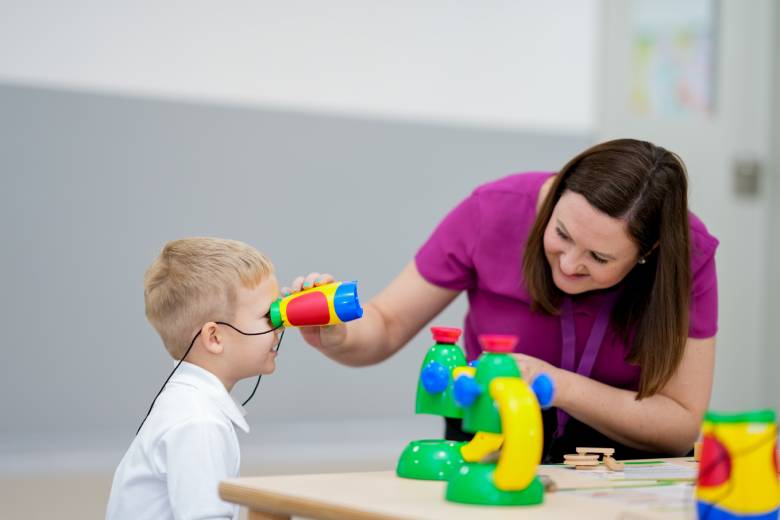In a rapidly shrinking world where borders blur and diversity defines the norm, Glendale International School stands as a beacon of educational excellence. Here, we delve into the transformative journey undertaken by the school, exploring its multicultural mosaic of students and educators, its innovative curriculum that marries traditional wisdom with cutting-edge technology, and its unwavering commitment to nurturing young talents. Discover how Glendale International School prepares students to tackle the challenges of an interconnected world, where cultural fluency, empathy, and adaptability are the currency of success, as we talk to the school’s principal, Jasmit Kang.
EdUAE: Can you tell me about your own educational background and your journey to becoming the principal of Glendale International School?
Jasmit Kang: I started my journey in Liverpool, in the UK, where I was born and bred. I taught at Waterloo Primary School for five years and was very lucky to do so; by the middle of the first year, I had risen to be Head of Year Six. I then moved to Birmingham in 2004 and worked in a variety of different good and outstanding schools, going through the Ofsted inspection process during this time, so I quickly learned what the benchmarks were in primary education. In 2010, I had my first SLT role and was instrumental in moving the school from ‘acceptable’ to ‘good’.
My journey at Glendale began in March 2022, and it was very exciting because it was a new school
I then moved to Dubai in 2014 as Deputy Head of Primary at Raffles International School, and was there for six years. I left to be head of primary at Capital School in 2020, which was a strange time to make a move, as it was during the pandemic. But it proved to be an inspired move, and within six months I had been promoted to Vice Principal, taking the school through two inspections in two years, BSO and KHDA. The school got a ‘good’ for the first time.
My journey at Glendale began in March 2022, and it was very exciting because it was a new school. That allowed me to have a personal touch, even down to little things like the logo and the uniform, and that’s what makes this job so special: being involved in the vision and mission of the school and where we want to take it.
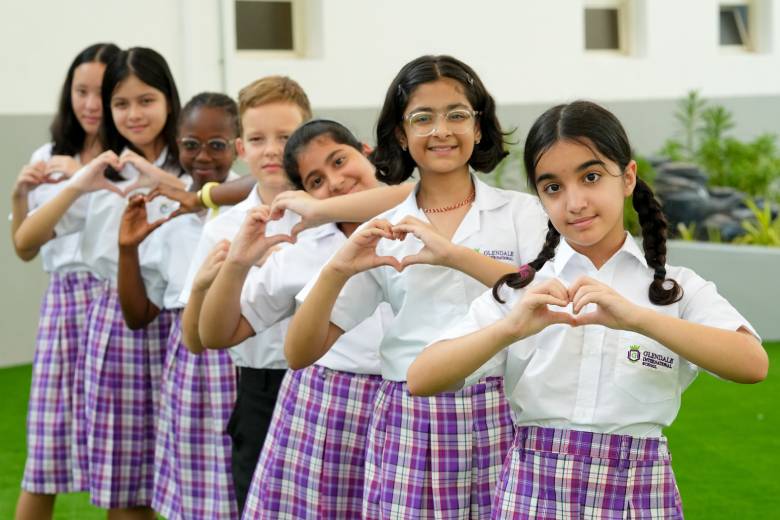
EdUAE: What is your vision for this school, and what are your key priorities for its growth and development?
JK: It is to make sure that every child is evolving, excelling, and being inspired – that’s our vision statement. We’re a British curriculum school, and we focus on character, leadership, and academic excellence. We have something we call our jewels of Glendale, which are the core values of the school: three R’s and three E’s
So we’re looking at respect, responsibility, and resilience in tandem with empathy, excellence, and empowerment. These are the values that I really wanted to instil in the school. Our creativity-inspired curriculum was also something that I really wanted to focus on, so we’ve allowed our children in primary to have access to different subjects that you wouldn’t normally have in many UK curriculum schools. For example, design technology is a subject that we should teach at Key Stage One and Key Stage Two. But not many schools are doing design technology as a discrete subject. Specialist equipment is required for that, but that is something I said we should be offering at the primary level. So now we have a design technology lab as well as a STEM lab, which not a lot of schools have. We have another kind of interactive space too, called an immersion lab, which, again, is very new to Dubai schools.
Drama is another area, so we have a drama room, the black box room, which we are using as part of the English curriculum. These are just a handful of examples of creativity-inspired spaces.
EDUAE: How do you foster a positive and inclusive school culture among students, teachers, and staff?
JK: This is something that is so important to me. I’ve always valued relationships between myself and all stakeholders, and that, of course, includes all teachers and students. We have, for instance, support for children who need it in terms of their language skills. We’ve got a number of ‘English as an Additional Language’ (EAL) children in our school. Some children from Russia, for example, have zero English, and they’re in Year Six. So to make sure every child is successful, they’re having translation of objectives into Russian so children can access the learning while being in every single class. And that’s one way of breaking down those barriers.
So, we are a very inclusive community, and I think that’s because we’re focusing on creativity-inspired learning spaces, where children are doing really well in music, art, and drama – collaborating together in those spaces – something that they may not be able to do in, for instance, an English lesson. They’re learning the language through these creatively-inspired spaces.
I think the biggest thing for me is for teachers to really know their class, know their students well, and make sure that they understand every single child who’s sitting in front of them. It’s not an easy job, but it’s something that all teachers strive to do.
We are a very inclusive community, and I think that’s because we’re focusing on creativity-inspired learning spaces
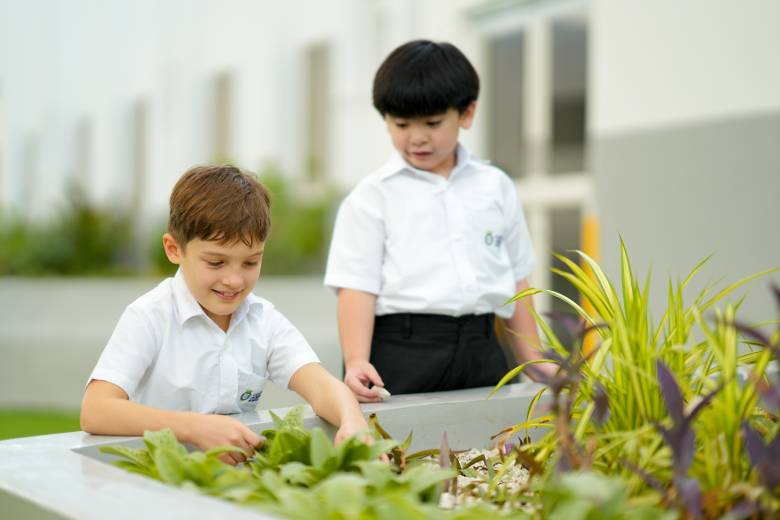
EdUAE: Can you describe any recent academic achievements or innovations at Glendale that you’re particularly proud of?
JK: I mentioned the design technology space, which is definitely a big thing for the children. I observe lessons where they really want to have the opportunity to create more, to design more, and to learn more. And that increased cross-curricular focus doesn’t really happen in UK curriculum schools as much as we’d like, but at Glendale, we are committed to that.
We have also introduced photography from FS to Year Six, which is running alongside our art programme. I can already see that parents are really happy that their children are getting to learn a new skill that they may not have had the opportunity to learn before. It also gives the youngsters a challenge, allowing them to focus on a new area of discovery.
One thing I want to mention is the outdoor learning spaces for all children at the school. So, we have over 200 species of plants on our campus already, and we are committed to having a focus on being a non-plastic school. We are looking at sustainability as a key feature of the curriculum, allowing children to learn outdoors in our green spaces. Inside the building are what we call our pods; we’ve got a play pod and a primary pod, which is again, open space for children to collaborate and share ideas. There are whiteboards all around the room. It’s a multipurpose space that teachers can use for different subjects.
We have over 200 species of plants on our campus already, and we are committed to having a focus on being a non-plastic school
EdUAE: How do you engage with parents and the local community to create a strong support network for the school? Tell me about the family, referral, and sibling discounts – are these popular with parents, and how much can they save?
JK: Engaging with parents is massive for us, with regular invitations sent out for school events, including assemblies and a ‘pink day’ that is coming up soon. Also, we are going to have a parent association set up before long, and we’ll be looking at how parents can support us for those key events. We will have parents on our governing board too.
It’s really important to have parent input, especially because we’re a new school. There is always room for improvement, and I really value what parents say in terms of what they think is working well and what we need to work on more. I want to have a regular coffee morning after half term, and I’ve already planned to do that. I’d like to get access to parents on a weekly basis. I don’t like doing things through email. I’m a principal who walks around the school daily and also meets parents regularly . So having weekly slots where parents can drop in and speak to me will be really valuable. We have parent-teacher conferences regularly, too. It’s really important that parents and teachers can sit down together and discuss the progress of the child, setting targets and how in partnership we can achieve that. .
As regards to referral discounts, we offer AED 1,000 off per family referred. And anyone who refers a family member is given a 20% discount; that’s for all our founding families for term one, which includes uniforms as well. We also offer a 10% sibling discount.
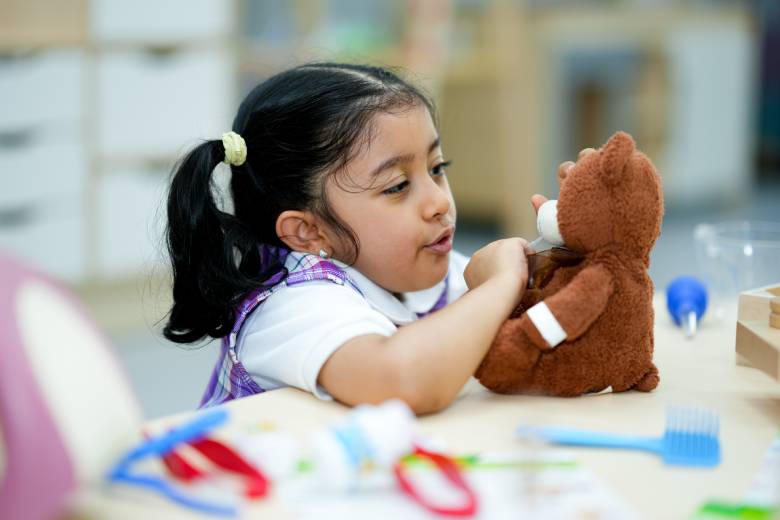
EdUAE: What extracurricular activities and programmes does the school offer to enhance students’ overall education and personal development?
JK: We have a well-being hour from 7.30 to 8.30. Most schools would have an after-school activity, which we also have, but that’s a paid option. However, I wanted something to be available for all children at the start of the day. And the reason I wanted to do that was because of my own experience. As adults, we usually like to have some time in the morning to perhaps exercise and get ready for the day ahead. I thought, well, rather than having the children go straight into a formal lesson at 7.30, which can be quite difficult for a child, why not start the day with a creative subject of their choice? So there are now offerings from Monday to Thursday, with a different option every day. I think that’s working really well. It sets the child up for the start of lessons at 8.45. This is optional and doesn’t have to be done every day; it is at the convenience of our families.
EDUAE: Can you share any future plans or goals you have for Glendale, both short-term and long-term?
JK: We have an established connection with a drama studio that’s going to work with Glendale for a whole school production of Charlie and the Chocolate Factory. We’re doing auditions for that at the moment, during the well-being hour. What is so special about that is that the school is covering all of the costs so that the children are getting free well-being sessions of drama where they will be part of an enriched end-of-school production. I don’t know of any other school that is doing that.
Also, we’re doing yoga on Thursdays with an agency called the Heartfulness Institute. We’ve been training our staff on a fortnightly basis about well-being and how to deal with stress. That will filter down to the children, who are doing mindfulness, relaxation and meditation techniques. All of the teachers will receive a certification by the end of term.
It’s important that the teachers feel supported, and it’s the first time I have done this programme for the entire school. It is usually very curriculum-driven, but I thought, no, I’m going to do things a little bit differently here. Mental health and wellness have to be a priority, and I know the teachers have seen the benefits of this programme. It’s just building up a support network and making sure that we are providing that for both staff and pupils putting their happiness at the forefront.
We will be launching our ‘Leader in Me’ programme, which is very special to Glendale. Again, this is something that I have done my own research on, based on work by the American educator and author Stephen Covey, which uses his same seven principles for effectiveness but in a child-friendly manner. It focused on those core soft skills that all schools are trying to implement, but we’re doing it in a way where it’s an actual programme for the children to follow.
We want to provide a plethora of subjects that children would not have experienced anywhere else. That’s a really unique selling point for Glendale, and it’s working very successfully.
We have a relationship with a drama studio that’s going to do a whole school production of Charlie and the Chocolate Factory
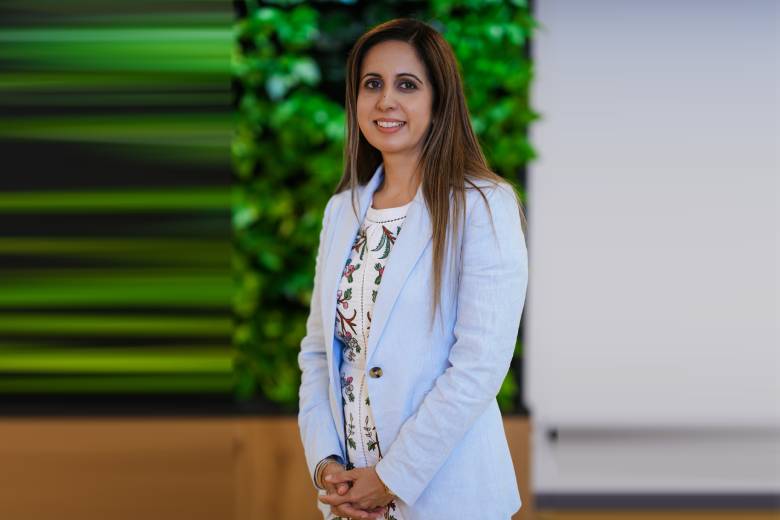
Jasmit Kang is the Founding Principal of Glendale International School, Dubai. She has 24 years of educational experience in NCfE schools in both the UAE and England. Jasmit believes that every child has an important and equal voice in the classroom and that educators have the key to unlock hidden talents and actively encourage the best in every child.












